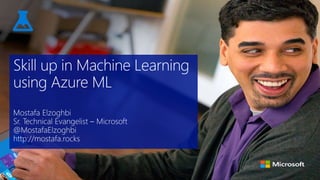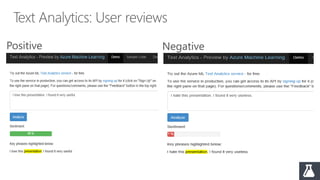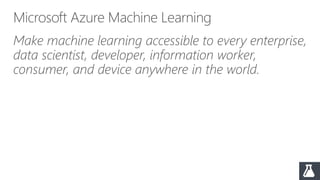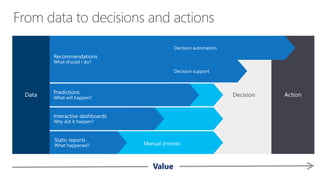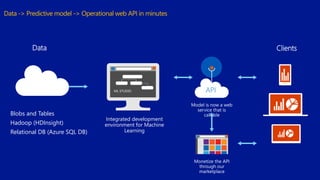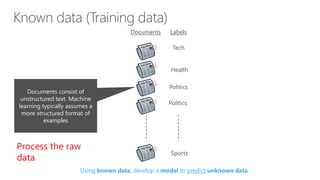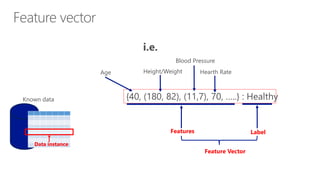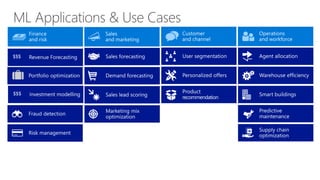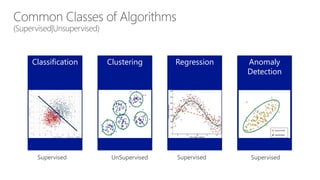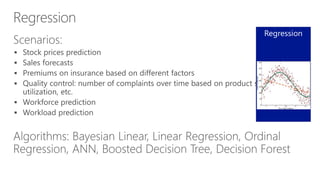Skill up in machine learning using Azure ML
- 3. data make decision drive actions
- 9. Value
- 11. R Python APIs
- 12. Get/Prepare Data Build/Edit Experiment Create/Updat e Model Evaluate Model Results Publish Web Service Build ML Model Deploy as Web ServiceProvision Workspace Get Azure Subscription Create Workspace Publish an App Azure Data Marketplace https://studio.azureml.net
- 13. Blobs and Tables Hadoop (HDInsight) Relational DB (Azure SQL DB) Data Clients Model is now a web service that is callable Monetize the API through our marketplace API Integrated development environment for Machine Learning ML STUDIO
- 16. Classify a news article as (politics, sports, technology, health, …) Politics Sports Tech Health Using known data, develop a model to predict unknown data.
- 17. Using known data, develop a model to predict unknown data. Documents Labels Tech Health Politics Politics Sports Documents consist of unstructured text. Machine learning typically assumes a more structured format of examples Process the raw data
- 18. Using known data, develop a model to predict unknown data. LabelsDocuments Feature Documents Labels Tech Health Politics Politics Sports Process each data instance to represent it as a feature vector
- 19. Known data Data instance i.e. {40, (180, 82), (11,7), 70, …..} : Healthy Age Height/Weight Blood Pressure Hearth Rate LabelFeatures Feature Vector
- 20. Using known data, develop a model to predict unknown data. Documents Labels Tech Health Politics Politics Sports Training data Train the Mode l Feature Vectors Base Model Adjust Parameters
- 21. Known data with true labels Tech Health Politics Politics Sports Tech Health Politics Politics Sports Tech Health Politics Politics Sports Model’s Performance Difference between “True Labels” and “Predicted Labels” True labels Tech Health Politics Politics Sports Predicte d labels Train the Model Split Detac h +/- +/- +/-
- 23. R Python
- 24. Classification Regression Anomaly Detection Clustering Supervised Supervised SupervisedUnSupervised
- 26. Classification
- 27. Clustering
- 28. Regression
Editor's Notes
- A) Main concepts to cover for Data Science: Regression Classification Clustering Recommendation B) Building programmable components in Azure ML experiments C) Working with Azure ML studio
- Actually it is the science on data
- Basic definition: Machine learning develops algorithms for making predictions (statistical sense) from data * Learning models from available training data, to make good predictions on unseen test data Highlight the keywords: Known Data, Model, Unknown Data and the Prediction (statistically…)
- Goto https://www.projectoxford.ai/demo/visions#Analysis and analyze this image to find its accent color
- Ready to use ML API published on Azure Datamarket place. A showcase of production ML solution in action (This can be used i.e. in shopping websites to see user reviews about a product etc.) Test by yourself some of the reviews comments on Expedia or other online shopping sites. Copy/paste user comments to see the analyze result. If sentiment result shows higher percentage number, it means it is positive. If the percentage is low than it is a negative comment. https://text-analytics-demo.azurewebsites.net/
- Azure ML aims to transform your data in to an intelligent action
- Lets look at some of the features of ML Studio
- Stages to develop end to end Azure ML solution. First you need an AML workspace... then you build a model under AML Studio, then publish it as web service and as an app (see text analytics demo in prior slides)
- With the cloud, you can bring in data sources with the ease of a drop down or drop your on-premises data set into the built in storage space. Users can then model in our development environment – Machine Learning Studio – where we’re offering R, Python and SQLite as first class citizens in addition to our world-class Microsoft algorithms. The second issue – and often the primary one – is putting finished work into production in a way others can use. We’ve heard from many data scientists that they model in R on a Linux stack but then have to hand over their work to developers who need to translate that into another language to actually make it work. This time consuming and unnecessary process has been eliminated with our system, as the model is with a click transformed into a web service end-point that can run over any data, anywhere and connect to any solution or client. Next, not only can this model be put into production for your company, it can be made available for the world on our Machine Learning Marketplace. Microsoft hosts your solution and markets it for you, while you have the freedom to brand and monetize as you see fit. We also offer a number of Microsoft solutions here.
- Just a brief info about some keywords used in ML
- Ratio of the Test/Training data is trivial. Depends on model, data size, quality etc. Split is random (i.e. which %80 portion of the data?) There is no rule to split into %80 & %20 … it might be %50 & %50 etc depending on the problem, model, case. If you are not happy with the Model’s performance than adjust the parameters and re-train the model. Or change the algorithm (training approach) behind the method…
- Confidential… + notes From the book: AzureMachineLearning – AzureFundamentals Many examples of predictive analytics can be found literally everywhere today in our society: Spam/junk email filters These are based on the content, headers, origins, and even user behaviors (for example, always delete emails from this sender). Mortgage applications Typically, your mortgage loan and credit worthiness is determined by advanced predictive analytic algorithm engines. Various forms of pattern recognition These include optical character recognition (OCR) for routing your daily postal mail, speech recognition on your smart phone, and even facial recognition for advanced security systems. Life insurance Examples include calculating mortality rates, life expectancy, premiums, and payouts. Medical insurance Insurers attempt to determine future medical expenses based on historical medical claims and similar patient backgrounds. Liability/property insurance Companies can analyze coverage risks for automobile and home owners based on demographics. Credit card fraud detection This process is based on usage and activity patterns. In the past year, the number of credit card transactions has topped 1 billion. The popularity of contactless payments via near-field communications (NFC) has also increased dramatically over the past year due to smart phone integration. Airline flights Airlines calculate fees, schedules, and revenues based on prior air travel patterns and flight data. Web search page results Predictive analytics help determine which ads, recommendations, and display sequences to render on the page. Predictive maintenance This is used with almost everything we can monitor: planes, trains, elevators, cars, and yes, even data centers. Health care Predictive analytics are in widespread use to help determine patient outcomes and future care based on historical data and pattern matching across similar patient data sets.
- More samples on: https://azure.microsoft.com/en-us/documentation/articles/machine-learning-algorithm-choice/ Mention about Classification, Regression etc.
- https://github.com/melzoghbi/techcasestudies-private/blob/40a7d27a35d7486426a5b62ab18d0930086873fb/_posts/2017-03-03-Delect.md
- Access Azure HOL Doc: https://aka.ms/azuremlhol

